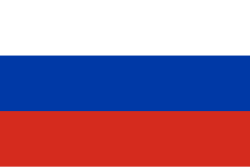 Russian tricolor flag | |
| Total population | |
|---|---|
| Approximately 1,300,000 Russian-speakers[1] | |
| Regions with significant populations | |
| Jerusalem, Tel Aviv, Haifa, Ashkelon, Ashdod, Bat Yam and many other places | |
| Languages | |
| Russian, Hebrew, Russian Sign Language,[2] Shassi | |
| Religion | |
| Judaism, also Russian Orthodox Church, non-religious, Secular Judaism | |
| Related ethnic groups | |
| Russians, Russian Jews, Ashkenazi Jews |
Russians in Israel or Russian Israelis are post-Soviet Russian citizens who immigrated to Israel and their descendants. As of 2022, Russian-speakers number around 1,300,000 people, or 15% of the Israeli population.[3][4] This number, however, also includes immigrants from the Soviet Union and post-Soviet states other than Russia proper.[1][5]
Some of the immigrants are not considered Jewish according to the Halacha, which defines a Jew if their mother is Jewish or they formally converted to Judaism. This makes it difficult for many of those Russian Israelis who are not recognised as Jewish by the chief rabbinate to get married or buried in Israel.[6] According to the Law of Return, anybody with at least one Jewish grandparent is eligible to become an Israeli citizen. Because of the Soviet Union's policy of state atheism and Russia's historically large Jewish population, there were some mixed marriages between Russian Jews and ethnic Russians during the Communist period. Some Russian Israelis have Israeli citizenship by marriage, as the Law of Return also allows the non-Jewish spouses of Jews to claim Israeli citizenship. A few Russian Israelis are instead descended from Russian Subbotnik families, who have migrated to Israel over the past century.[7]
Most Russians in Israel have full Israeli citizenship. Israeli Russians are involved in the country's economy on all levels and have made invaluable contributions to Israeli society, particularly in the cultural, scientific, high-tech, medical, and education fields. One in four staff members at Israel’s universities now are native Russian speakers.[6] Many Russian Israelis choose to preserve their language and culture, There are Russian language newspapers, television stations, schools, and social media outlets based in Israel such as Channel 9, Pervoe radio, Vesty and others. Many Russian Israelis also celebrate Russian holidays like Novy God and Victory Day.
- ^ a b "Monthly Bulletin of Statistics". Cbs.gov.il. Retrieved 2011-03-22.
- ^ Lanesman, Sara; Meir, Irit (2012). "The survival of Algerian Jewish Sign Language alongside Israeli Sign Language in Israel". In Zeshan, Ulrike; de Vos, Connie (eds.). Sign Languages in Village Communities : Anthropological and Linguistic Insights. Boston: De Gruyter. p. 155. ISBN 978-1-61451-203-5.
In addition to the languages that emerged and developed in Israel, at least two languages were brought by immigrants and are still used in Israel today: Russian Sign Language (Yoel 2007) brought by immigrants from the former Soviet Union in the 1990s...
- ^ Amanda Borschel-Dan. "25 years later, Russian speakers still the 'other' in Israel, says MK". www.timesofisrael.com. Retrieved 2022-02-25.
- ^ "Russian-Speaking Israelis Go to the Polls | Wilson Center". www.wilsoncenter.org. Retrieved 2022-02-25.
- ^ Russian-Israelis vote for next Kremlin leader by Polina Perlman, Published: 03.04.12, ynetnews
- ^ a b "Russians in Israel". My Jewish Learning. Retrieved 2024-12-28.
- ^ "Meet the Subbotniks - from Russia to Israel". www.israelnationalnews.com. Retrieved 2024-08-11.
© MMXXIII Rich X Search. We shall prevail. All rights reserved. Rich X Search
